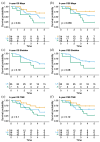Presentation and survival for urachal cancer: Findings from a nationwide multicenter cohort study in Norway
- PMID: 40767288
- PMCID: PMC12572362
- DOI: 10.1177/03915603251358961
Presentation and survival for urachal cancer: Findings from a nationwide multicenter cohort study in Norway
Abstract
Background and objective: This study aims to map the prevalence and treatment of urachal cancer (UrC) in Norway, establish survival rates, identify prognostic factors, and evaluate whether any of the three commonly used staging systems for UrC provide superior prognostic value.
Methods: In this retrospective cohort study, data from the National Cancer Register was collected to identify patients diagnosed with UrC between1997 and2022. Eligible cases (n = 43) underwent retrospective review of their individual hospital records. All patients were staged using the Sheldon, Mayo, and Limonnik-revised TNM systems. This was performed locally and then checked by the coordinating center.Key findings and limitations:The median age at surgery was 59.5 years (IQR 49-73), with 57% of patients being male. The median follow-up time for survivors was 98 months (IQR 81-153). Macroscopic hematuria was the most common presentation (67%, n = 28). Recurrence-free survival (RFS) rates at 1, 3, and 5 years were 71%, 57%, and 53%, respectively. Cancer specific survival (CSS) was 95%, 62%, 55%, and overall survival (OS) rates were 93%, 61%, 46% at the same time points. Smaller tumor size was an independent predictor of improved CSS (HR 1.3, CI: 1.01-1.6, p = 0.045). Of the three staging systems, only the Mayo system showed statistically significant differences between stages for OS, while none of the systems, including Mayo, showed significant differences for CSS. Study limitations include a small sample size and a prolonged study period of 25 years, which may affect the generalizability of the findings and introduce bias due to changes in clinical practice over time, such as advancements in surgical techniques, and oncological therapies.
Conclusions and clinical implications: Urachal cancer is frequently diagnosed at an advanced stage. Our findings suggest that the Mayo system more effectively distinguishes between localized, locally advanced, and advanced disease compared to the Sheldon and Limonnik-revised TNM systems.
Keywords: Urachal cancer; bladder cancer; survival; urachus.
Conflict of interest statement
Declaration of conflicting interestsThe author(s) declared no potential conflicts of interest with respect to the research, authorship, and/or publication of this article.
Figures


References
-
- Szarvas T, Módos O, Niedworok C, et al. Clinical, prognostic, and therapeutic aspects of urachal carcinoma-a comprehensive review with meta-analysis of 1,010 cases. Urol Oncol 2016; 34(9): 388–398. - PubMed
-
- Sheldon CA, Clayman RV, Gonzalez R, et al. Malignant urachal lesions. J Urol 1984; 131(1): 1–8. - PubMed
Publication types
MeSH terms
Supplementary concepts
LinkOut - more resources
Full Text Sources
Medical

